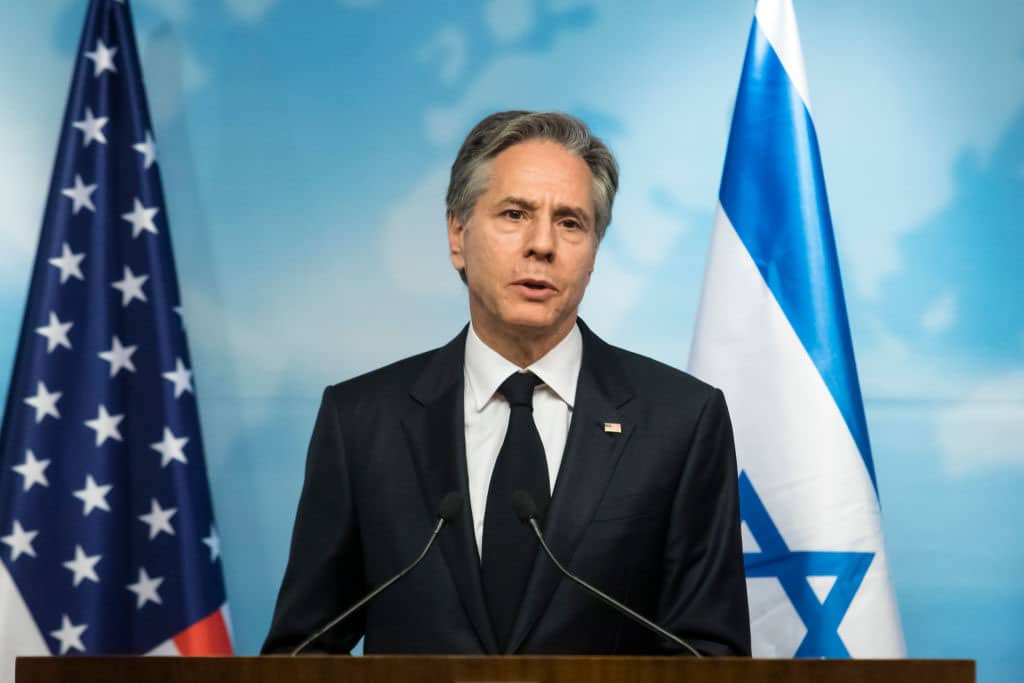 U.S. Secretary of State Antony Blinken at a press conference on January 30, 2023 in Jerusalem, Israel. (Photo by Amir Levy/Getty Images)
U.S. Secretary of State Antony Blinken at a press conference on January 30, 2023 in Jerusalem, Israel. (Photo by Amir Levy/Getty Images) As the end of the current cease-fire loomed over the Gaza Strip and tensions rose in Israel, US Secretary of State Antony Blinken arrived in the country on Thursday to try to reach an agreement to extend the truce between Israel and Hamas. This is Blinken’s third visit to the region since the war began with Hamas’ surprise attack on Israel on October 7.
Blinken first met with Israeli President Herzog just minutes after two Palestinians affiliated with Hamas attacked a Jerusalem bus stop with M-16s and a handgun. The attack saw three Israelis killed and several others wounded. Later, Blinken met with Israeli Prime Minister Benjamin Netanyahu in the capital.
The cease-fire, in place since last Friday, enabled the release of tens of Israeli hostages and other foreign nationals that terrorists in the Gaza Strip held hostage for over 50 days. In return, Israel allowed a steady flow of increased humanitarian aid to enter Gaza while also releasing Palestinian prisoners held in Israeli jails.
“This process is producing results,” said Blinken at the beginning of the meeting with Herzog. “It’s important, and we hope that it can continue.”
There are approximately 145 people still being held captive by Hamas and other terrorist organizations in Gaza. Some also hold American citizenship, adding to the pressure the US administration is applying to lengthen the cease-fire. The US is also putting pressure on Qatar, Hamas’ main backer and the broker of the current cease-fire.
Blinken also said he wanted to discuss the future of the Gaza Strip with the Israeli government despite Israel’s avoidance of dealing with the issue at this point.
“The United States firmly supports Israel and its right to defend itself and to try to ensure that October 7 never happens again,” he said. “At the same time, I look forward to detailed conversations … about the way ahead in Gaza.”
Israel has pushed back on attempts to discuss the future of the Gaza Strip, with officials saying they are concentrated on the war effort. However, if Israel is successful in removing Hamas from power as it seeks to do, it will not be able to avoid dealing with the matter.
The US and Israel have several points of contention regarding the war and its aftermath. These disagreements have been openly aired in recent days.
“These things should be ironed out behind closed doors,” said Professor Eytan Gilboa, an expert on the US at Bar-Ilan University and senior fellow at the Jerusalem Institute for Strategy and Security. “Discussing disagreements publicly is bad, it is a signal to Hamas that there are differences between the US and Israel which strengthens their position to refuse any offer they receive.”
But since the beginning of the war, Israel has received unprecedented support from the US and its president, Joe Biden.
So far, the US has supplied Israel with ammunition, replenished its air-defense rocket stock, and mobilized forces and aircraft closer to the region. Reports also indicate the use of US military drones over Gaza to assist Israel in locating hostages. In October, the US House of Representatives approved a massive $14 billion military aid package for Israel, in addition to the annual aid provided.
Moshe Roth, a member of Israel’s parliament, the Knesset, from the United Torah Judaism party, asserts that there are significantly more points of agreement than contention between Jerusalem and Washington.
“There is an understanding that the enemy is a common one,” Roth, a member of the Knesset Foreign Affairs and Defense Committee, told The Media Line. “This provides cover for most of the joint interests, which for both Israel and the US include the destruction of Hamas.”
Securing the hostages’ release has been a top priority for both Israel and the US. While Israel has vowed to resume the conflict once the cease-fire, potentially ending as early as Friday, concludes, the US is focused on securing as many hostages as possible, even if it impacts the war effort.
“In the US, the image of bringing hostages home is considered a victory that comes with great political credit,” stated Roth, who is an American Israeli. “In Israel, this is also important. But the difference now between the US and Israel is on what needs to be done right now. For Blinken the value of a cease-fire is greater than it is to Israel.”
The majority of Israeli public opinion favors removing Hamas’ control over Gaza. Despite a strong desire for all hostages’ release, there’s an understanding that this may be unattainable and that the offensive against Hamas must resume.
“The more time passes, there will be more voices in the US calling on Israel to stop the fighting,” said Roth.
The US is pressuring Qatar, a key mediator in the latest deal, to help secure the release of additional hostages.
“As part of its strategy, Hamas is holding on to the American hostages because it believes they are a greater asset,” said Gilboa. “In domestic American eyes, as long as there are American hostages, this is perceived as a failure of Biden’s foreign policy.”
“If American pressure on Qatar will not bring to their release, it will strengthen the Israeli demand to continue with the war effort,” he added.
Although the US agrees with Israel’s continued war on Hamas until its removal, the White House has reportedly requested Israel to avoid further displacement of Palestinians in the Gaza Strip. United Nations data indicates that nearly 1.8 million Gaza residents have been displaced following evacuation orders by the Israeli army.
Most displaced residents are now concentrated in the Gaza Strip’s south. Israel is expected to focus the next steps of its military campaign in the south, where it suspects the senior Hamas leadership and much of its military infrastructure are located.
“The US agrees to the resumption of the war, but under certain limitations,” said Gilboa. “They are asking Israel to make sure to minimize the loss of life of uninvolved civilians because they are considered Israel will lose the legitimacy for its military operation.”
A Reuters report on Thursday indicated that the US was urging Israel to confine combat zones in southern Gaza.
Differences are likely to emerge between the two allies.
“The future of the fighting will be the focal point of the differences of opinions,” said Roth. “Israel will be walking a fine line, with its military seeking more room to act in southern Gaza. A large number of civilian casualties will require Israel to use all of its political abilities to secure American support.”
The Gaza Health Ministry, run by Hamas, reports that over 15,000 Palestinians have been killed due to the Israeli offensive.
“Any scenario with a large number of civilian casualties will test Israel’s ability to convince the US,” added Roth.
From the war’s outset, the White House has consistently emphasized to Israel the critical importance of the war’s endgame in shaping its conduct. Although Blinken and other officials have expressed a desire for the Palestinian Authority (PA) to play a significant role in Gaza post-Hamas, Israel’s perspective differs.
“The PA does not look like it can or wants to take control of Gaza,” said Roth. “This is not just a technicality to Israel. The PA does not present itself as someone who wants to live alongside Israel and the US is aware of this.”
For many Israelis, including senior figures in the government, the discussion is premature, despite its necessity.
“Hamas needs to be dismantled before such a discussion,” said Gilboa. “The US has an obsession with the endgame of wars, but Israel would be smarter in laying out its conditions for the day after Gaza that will serve its goal, rather than flat-out rejecting any suggestion.”
Given their robust relationship and the US’s steadfast support for Israel during this crisis, it’s likely the two will reconcile any differences.
“We will not see a major collision,” Gilboa summarized. “Israel will do whatever it can to limit the differences because US support is critical for every aspect of the war.”
To read more articles from The Media Line, click here.























 More news and opinions than at a Shabbat dinner, right in your inbox.
More news and opinions than at a Shabbat dinner, right in your inbox.